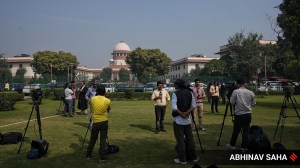- India
- International
Farm laws are only way to push agriculture out of low-income trap
If the farm laws are to be repealed, it would sound a death knell for the efforts to improve the agriculture sector, for no political party in government would ever dare carry out agricultural reforms again
 Farmers sit in protest against the new farm bill at Singhu border on January 19, 2021 (Express photo by Abhinav Saha)
Farmers sit in protest against the new farm bill at Singhu border on January 19, 2021 (Express photo by Abhinav Saha)Indian agriculture grew at about 1 per cent per annum in the 50 years before Independence. It has grown at about 2.6 per cent per annum in the post-Independence era to become the world’s second-largest food producer. This transformation has been possible through increasing the area under cultivation and adoption of modern production technologies. Though agriculture is India’s main occupation, its contribution to GDP hovers around 17 per cent because farm productivity has almost stagnated. Feeding the world’s second-most populated country remains a prime responsibility and the government has to find ways to retain farmers’ interest in agriculture.
Compared to the world average of 11 per cent, around 51 per cent of India’s area is already under cultivation, with rainfed drylands constituting 65 per cent of the net sown area. There is no further scope to increase the area under cultivation and agriculture research fatigue has strangled crop productivity. According to the last agricultural census, of 14.57 crore agricultural holdings in the country, 12.56 crore (86.21 per cent) are small and marginal holdings (less than 2 hectares) representing 47 per cent of the total operated agricultural area. With an average of at least four members per family, agriculture is the source of livelihood for this half a billion people, generating an approximate monthly income of Rs 6,000 — Rs 50 per person per day. It is this segment of the farming community whose income from agriculture needs to be enhanced to stop their migration to the non-agriculture sector.
World over, it is the farmer who decides the market price of his produce, but in India, it is decided by intermediaries. During harvest, agricultural production centres see a glut of produce at throwaway prices whereas shortages and high prices rule the roost at consumption centres. About 16 per cent of fruits and vegetables and 10 per cent of oilseeds, pulses and cereals perish before reaching the consumer’s table, while the Global Hunger Index (GHI) of International Food Policy Research Institute ranked India 100th out of 118 countries in 2018. The 15th Finance Commission observed that power subsidies imperil our already-stretched groundwater resources. India’s electricity consumption in agriculture is far greater than any comparable country and withdrawal of groundwater is more than China’s and the US’s put together.
Over the years, influenced by government interventions like MSP, seed, fertiliser subsidies, our agriculture production system has been primarily rice-wheat centric. These interventions were once essential for food security. Once achieved, they should have been tweaked to enforce reforms to bring agriculture in tune with market demands, incentivise crop diversification, and create infrastructure to modernise agriculture. The economic boom of the last 25 years is due to the opening up of the economy that began under Prime Minister PV Narasimha Rao. This is exactly what is required in the agricultural sector. The three farm laws reforming the agriculture sector are much-needed.
Processing is the mantra to generate higher income from agri-produce and calls for private investment. However, private investment entails profit-making and for this to happen, the investor needs to have a say in the sale of the agriculture produce. This is possible when the investor has a legal agreement or “contract” with the farmer-producer guaranteeing sale of produce at pre-determined quality, quantity and price. This is what the Farmers (Empowerment and Protection) Agreement On Price Assurance and Farm Services Act, 2020 provides for. The Act envisages the investor to provide farm services in the form of technology infusion for achieving the desired production, protection against acquisition of farmer’s land and dispute redressal mechanism. The apprehension that this Act would lead to the exploitation of farmers is unfounded.

Not receiving the right price is the main reason for farmers’ dissatisfaction. The Farmers’ Produce Trade and Commerce (Promotion and Facilitation) Act, 2020 now gives liberty to the farmer-producers to sell their produce to any trader or through modern electronic platforms to any place at a price decided by him. The Act also defines who is the trader of agricultural commodities, sets the time limit for payments and includes a dispute redressal system. This Act liberates the sector from the APMC Act, which provided an opportunity for the middleman to dictate prices and pocket a lion’s share of profits.
Creation of storehouses etc. makes it possible inter alia to store perishable agri-produce and make them available during the off-season when prices are high and maintain year-round supply of agri-raw materials for processing factories. Keeping these requirements in mind, the Essential Commodities (Amendment) Act, 2020 was passed to regulate the supply of certain foodstuffs only under extraordinary circumstances. To prevent the black marketers from taking the advantage of this well-intended law, a rider could have been added setting limits on the storage of directly-consumable products.
The three Farm Acts intended to break the logjam in the agriculture sector. How they hamper farmers’ interest has not been explained by any of the agitating farmers’ organisations or their political sympathisers. The argument that these laws would result in loss of state revenue is absurd as the state cannot earn revenue by keeping farmers in perpetual poverty.
If the farm laws are to be repealed, it would sound a death knell for the efforts to improve the agriculture sector, for no political party in government would ever dare carry out agricultural reforms again, much like how the family planning programme has been forgotten in the country.
This article first appeared in the print edition on January 23, 2021 under the title ‘Rollback is not the answer’. The writer is former agriculture secretary, government of West Bengal
EXPRESS OPINION
More Explained
Apr 26: Latest News
- 01
- 02
- 03
- 04
- 05











































